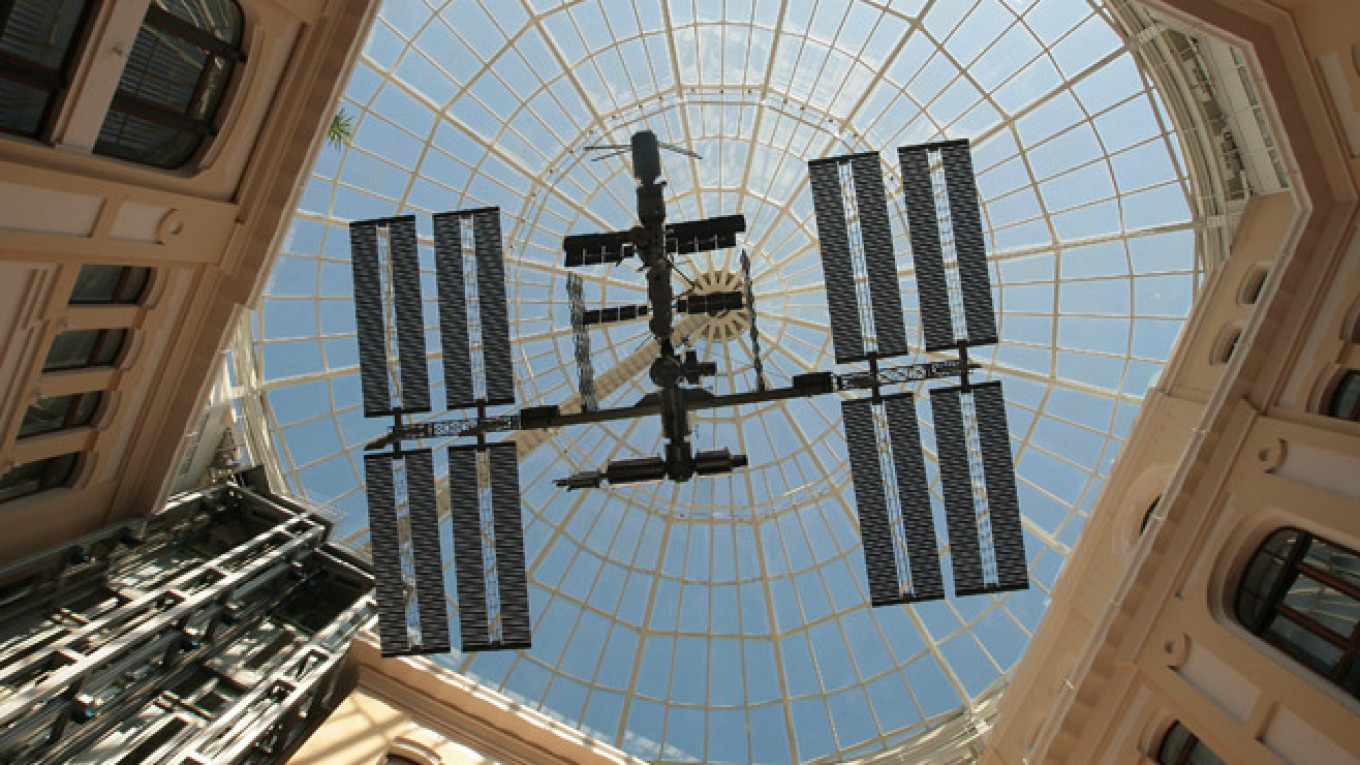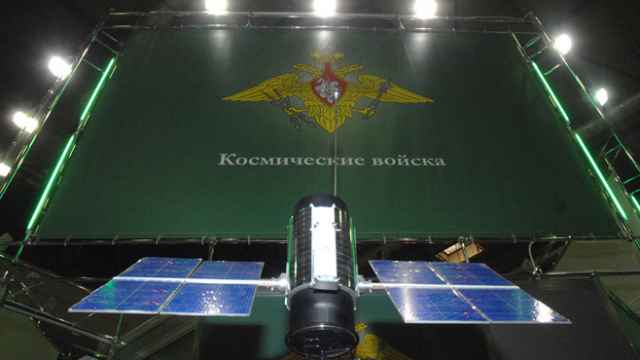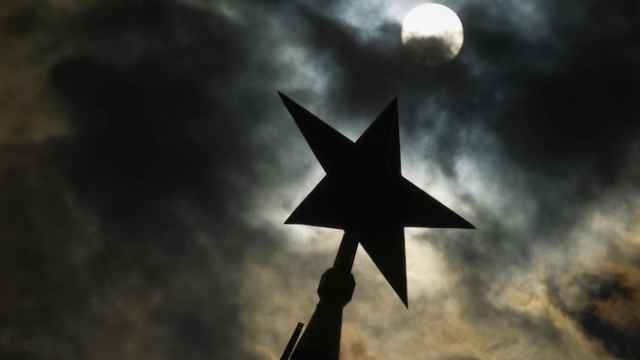Russia may be planning to build a new, independent national space station rather than prolong its participation in the $150 billion International Space Station (ISS) program beyond its current 2020 end date, the Kommersant newspaper reported Monday.
The U.S. space agency NASA proposed last year to extend the life of the ISS — the largest international project ever undertaken by nations during peacetime — beyond its currently scheduled 2020 end date to at least 2024.
While engineering studies quickly found that the station was structurally capable of surviving well into the 2020s, the space agencies involved in the project are now waiting for government approval to extend the project. But with the conflict in Ukraine driving a wedge between Russia and the West, officials in Moscow have said they may reject NASA's offer and chart their own path in space — marking a possible regression to Cold War-style competitive space exploration
Although no official word from Russian space officials has yet been issued on an ISS extension, a senior source at the Central Research Institute of Machine Building (TsNIIMash) — the federal space agency's think tank — told Kommersant on Monday that Russia will begin constructing a new space station to replace its segment of the ISS as early as 2017.
Referring to three modules currently intended to be attached to the ISS between 2017 and 2018, the source said: "The initial configuration [of the new Russian space station] will be constructed on the foundation of the Multipurpose Laboratory Module, a node module, and the OKA-T free-floating laboratory spacecraft."
Russian space industry analyst Pavel Luzin told The Moscow Times that he did not put much stock in the proposal.
"How can they suddenly plan a new space station? It's impossible," he said, adding that although there are new ISS modules on the way, they are in various states of completion and require additional funding.
TsNIIMash's press service declined to comment when asked by The Moscow Times to confirm the existence of plans for the new space station. Russia's federal space agency, Roscosmos, did not respond to a request for confirmation.
Later on Monday, Interfax cited an unidentified Roscosmos source as saying that the agency had no plans to begin developing a new space station in 2017, and that such a proposal would be technically and financially unfeasible.
Old Idea, New Circumstances
Proposals for a new Russian manned space station project known as the Orbital Piloted Assembly and Experiment Complex (OPSEK, in Russian) predate the current period of U.S.-Russian tensions as well as NASA's recent proposal to extend the ISS program beyond 2020.
Since as early as 2004, Russian space officials have planned on using their ISS modules to build a new national space station once the international program draws to a close in 2020.
But according to Kommersant's TsNIIMash source, Russia is now looking to bypass the ISS altogether and use the upcoming modules to create a brand-new space station three years ahead of schedule.
According to the paper, the new space station would be placed in an orbital inclination — the path a spacecraft or space station follows relative to the Earth's equator — better suited for Russian launches from its new Vostochny Cosmodrome in the far-eastern Amur region and the northern Plesetsk cosmodrome.
This would allow Russia to easily use to station as a base for testing yet-undeveloped spacecraft to transport people to the moon and into deep space. The path, angled at almost 70 degrees off the Earth's equator, also allows the station to observe 90 percent of Russia's territory, including the Arctic shelf.
Follow the Money
Although budgetary and logistical aspects of developing a new space station independent of the ISS before 2020 are not yet known, several statements and Russian media reports from earlier this year offer insight into Russia's intentions.
In September, Deputy Prime Minister Dmitry Rogozin — who oversees the space industry — announced that the upcoming federal space program for 2016-2025 would allocate an unprecedented 321 billion rubles ($6.8 billion) to further develop and utilize the ISS, and complete the OKA-T free-flying laboratory module.
This number far exceeded the 215 billion rubles that Russia has spent on the ISS from 2001 to 2012 — the period during which the space station was being constructed.
In October, Roscosmos deputy director Dennis Lyskov said Russia was evaluating its future in the ISS program in the context of its lunar ambitions, and spoke of using Russia's three new ISS modules as the basis for a new space station.
Meanwhile, leaked excerpts of the federal space plan indicate that 4 billion rubles ($84 million) will be spent to launch the new Multipurpose Laboratory Module, a central hub module, and a docking module to ISS in 2017, but does not mention a new space station in the near term.
Another module identified as part of the new space station, according to Kommersant's diagram, appears to be an inflatable space station module — a technology currently being pioneered by U.S. commercial space firm Bigelow Aerospace in partnership with NASA.
In a leaked excerpt from Russia's upcoming federal space program for 2016-2025, Roscosmos is requesting 16 billion rubles ($338 million) to develop a 300-cubic-meter inflatable space station module of its own.
Regardless of what Russia intends to do with its new space hardware, officials at all levels have persistently stated that Roscosmos will honor its commitments to the ISS until 2020. With the government set to rule on both the extension of the ISS program and the proposed federal space program as early as December, the stars may be aligning for Russia to pull out of space cooperation with the U.S.
Contact the author at [email protected]
A Message from The Moscow Times:
Dear readers,
We are facing unprecedented challenges. Russia's Prosecutor General's Office has designated The Moscow Times as an "undesirable" organization, criminalizing our work and putting our staff at risk of prosecution. This follows our earlier unjust labeling as a "foreign agent."
These actions are direct attempts to silence independent journalism in Russia. The authorities claim our work "discredits the decisions of the Russian leadership." We see things differently: we strive to provide accurate, unbiased reporting on Russia.
We, the journalists of The Moscow Times, refuse to be silenced. But to continue our work, we need your help.
Your support, no matter how small, makes a world of difference. If you can, please support us monthly starting from just $2. It's quick to set up, and every contribution makes a significant impact.
By supporting The Moscow Times, you're defending open, independent journalism in the face of repression. Thank you for standing with us.
Remind me later.






